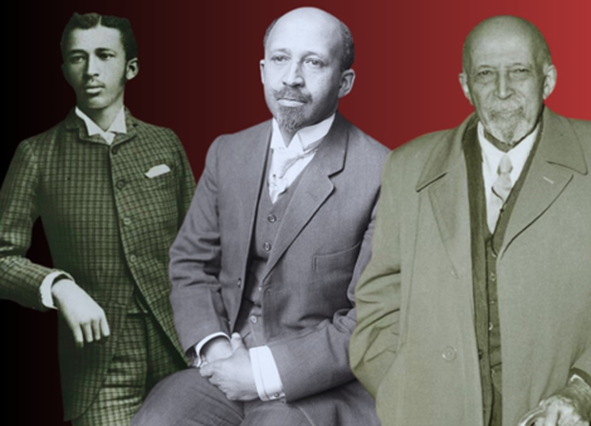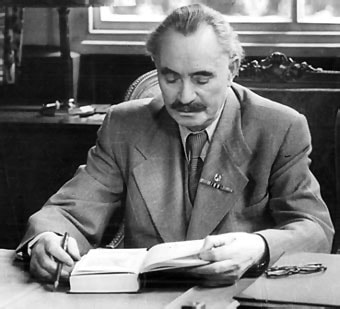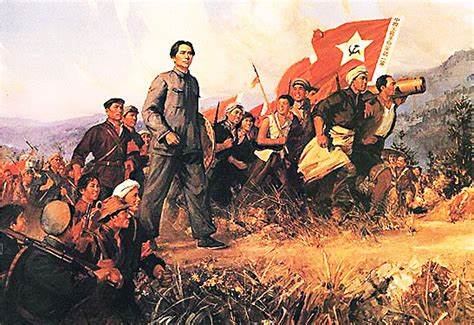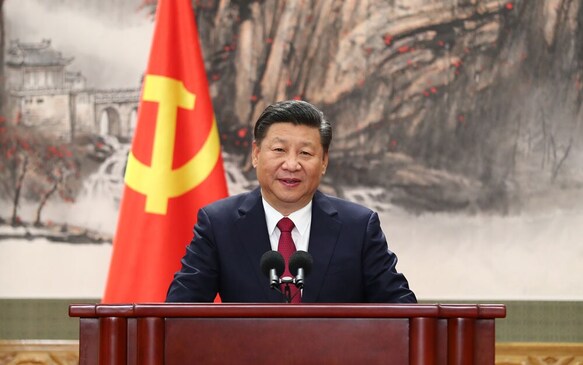|
2/8/2023 The Importance of Combatting National and Historical Nihilism. By: Carlos L. GarridoRead NowThis article is taken from a section of the author’s forthcoming book, The Purity Fetish and the Crisis of Western Marxism. It is an imperative that we remember the words of Georgi Dimitrov, a giant of the world communist movement, in his speech to the Seventh World Congress of the Communist International in 1935. Here he would say the following comments on national nihilism, a phenomenon so rampant in American Marxists today: Mussolini does his utmost to make capital for himself out of the heroic figure of Garibaldi. The French fascists bring to the fore as their heroine Joan of Arc. The American fascists appeal to the traditions of the American War of Independence, the traditions of Washington and Lincoln… I have quoted this document at length because it magnificently captures one of the central forms the purity fetish expresses itself through in the US: national nihilism. We cannot allow the most reactionary segments of our monopoly capitalist class to win the ideological war over the national history of our people. We must be able to work creatively, to take the progressive elements of our national past – which, although obscured by our ruling class, exist in abundance – and to rearticulate these elements towards socialism. This is what Dimitrov means when he says that we must “enlighten the masses on the past of their people in a historically correct fashion, in a genuinely Marxist-Leninist spirit.”[2] National and historical nihilism must be destroyed. As J.V. Stalin correctly said, “national nihilism only injures the cause of socialism, because it plays into the hands of the bourgeois nationalists.”[3] It is a quintessential manifestation of the purity fetish – because the national past is impure, the purity fetish Marxists reject working with its progressive elements and incorporating these into the struggle for socialism. Our country’s history, indeed, is a history marked by conquest, enslavement, genocide, exploitation, imperialism, and all the other evils brought by the development of the capitalist era in world history. It is also marked, however, by the struggles against feudal absolutism; by a promise for universal life, liberty, and pursuit of happiness – all demands which are unfulfillable within the capitalist mode of life; by the struggles against chattel slavery, wage slavery, genocidal attacks on indigenous communities; by the struggles, in the 20th century, against fascism, imperialism, for civil rights, for peace, etc. This is a complex, heterogeneous, and impure history. It is, in short, a contradictory history, containing within itself a unity of opposing forces – one which fights for human emancipation, the other which fights for preserving the tyranny of capital. We must learn how to use these objective contradictions to our advantage. The task ahead of us requires aligning our struggles today with the positive elements of the past and connecting the moribund capitalist-imperialist forces of our day with our past’s negative elements. This is not an easy task. As Mao argued while condemning national nihilism, Every nation in the world has its own history and its own strengths and weaknesses. Since earliest times excellent things and rotten things have mingled together and accumulated over long periods. To sort them out and distinguish the essence from the dregs is a very difficult task, but we must not reject history because of this difficulty. It is no good cutting ourselves off from history and abandoning our heritage. The common people would not approve.[4] This difficulty is embedded in the need to develop socialism according to the concrete conditions of a country. As Lenin said, All nations will move towards socialism; it is inevitable. But the process will not be exactly the same for all nations … each nation will have its own characteristics.[5] This is why, the same Lenin which in one breath condemns Russia’s role as “a prison of nations,” in another says:[6] Are we class-conscious Great-Russian proletarians impervious to the feeling of national pride? Certainly not. We love our language and our motherland; we, more than any other group, are working to raise its laboring masses (i.e., nine-tenths of its population) to the level of intelligent democrats and socialists. We, more than anybody are grieved to see and feel to what violence, oppression and mockery our beautiful motherland is being subjected by the tsarist hangmen, the nobles and the capitalists. With details adjusted to context, we may say something similar about the US today. We, too, could say that we are proud of our revolutionary class and its rich revolutionary history. We, too, could say that precisely because we are proud of this history – and because we are driven by the “great feelings of love” for the people that Che mentions – we wholeheartedly condemn our genocidal, slavish, exploitative, and imperialist past and present.[8] For Lenin, Mao, Fidel, Ho Chi Minh, Chávez, and other successful socialist leaders, the question they asked themselves concerning their national past was never “is it pure enough?” but “how can we use the national traditions ingrained in our people’s common sense and feelings to fight for socialism?” In China this has taken the form of Socialism with Chinese Characteristics; in Cuba this has meant incorporating José Martí and the anti-colonial traditions into socialist construction; in Venezuela this has taken the form of Bolivarian socialism; in Bolivia this has taken the form of combining Marxism (scientific socialism) with the indigenous communist traditions which have been around for centuries. The same can be seen in the socialist struggles in Africa (Pan-African Socialism), the Middle East (Islamic Socialism), and other parts of Asia and Latin America. One would have to be blinded by a liberal tinted American exceptionalism to think that the struggle for socialism in the US will itself not have to follow this concrete universal tendency seen around the world, where scientific socialism functions as the content which takes form (i.e., concretizes) according to the unique circumstances in which it is being developed. Dialectics (both in Hegel and in Marxism) rejects the idea of an unchanging, pure, ahistorical universal, and instead urges that universals are necessarily tied to historically changing concrete particulars. Universals are always concrete – that is, they exist and take their form through the particular. “The universal,” as Hegel and Lenin emphasized, “embraces within itself the wealth of the particular.”[9] There is no such thing as abstract socialism. Socialism is the universal which cannot exist unless concretized through the particular. Socialism in the US will have to take form in accordance with the unique history and conditions of the country. By embracing a petty historical and national nihilism, the contemporary American Marxist finds themselves unfit to 1- understand their national past concretely (i.e., dialectically and correctly) and 2- build a successful struggle for socialism. This infantilism is a manifestation of the purity fetish and will be removed when such an outlook is overcome by the dialectical materialist worldview. Few people have studied the counterrevolution in the Soviet Union closer than the Chinese, who are keen on not repeating the same mistakes as the Soviets. One of the most important lessons the Chinese take from the fall of the USSR is precisely the existential importance of rejecting historical nihilism (lishi xuwuzhuyi), which they describe as the view that “Marxism was outdated and socialism had ‘failed’ (after 1989 in Eastern Europe and the Soviet Union); the CPC was an aberration in Chinese history; fawning on foreign powers; and the denial of or ‘farewell’ to the revolution.”[10] As Roland Boer has noted, “the disaster that befell the Soviet Union is seen as a clear example of the effects of historical nihilism.”[11] As Xi Jinping has argued, [One] important reason for the disintegration of the Soviet Union and the collapse of the CPSU is the complete denial of the history of the Soviet Union, and the history of the CPSU, the denial of Lenin and other leading personalities, and historical nihilism confused the people’s thoughts.[12] Unlike in the USSR, as Carlos Martinez notes, Although the Chinese leadership made serious criticisms of certain policies associated with Mao (in particular the Great Leap Forward and the Cultural Revolution), it has never come anywhere close to repudiating Mao and undermining the basic ideological and historical foundations of Chinese socialism. No Chinese Wall has been constructed between the Mao-era and the post-Mao era; the two phases are inextricably linked.[13] As Deng Xiaoping said in 1980: We will forever keep Chairman Mao’s portrait on Tiananmen Gate as a symbol of our country, and we will always remember him as a founder of our Party and state. . . . We will not do to Chairman Mao what Khrushchev did to Stalin.[14] Although these comments are specifically made within the context of socialist states, the universal we can observe concretized in the particular is the general condemnation of historical nihilism. Historical and national nihilism share a common logic – a rejection of the past because of its impurity. If the past contains errors, excesses, imperfections, it is nothing. Only that which is pure is salvageable. This manifestation of the purity fetish not only prevents a correct dialectical assessment of the past, but also works as a deadly fetter for the movement towards socialism. In the US, historical and national nihilism are not simply attitudes about the past – they are attitudes about the present and future. Their relevance is far from being merely scholarly. If we are unable to connect our people’s progressive history to our contemporary struggle for socialism, then socialism will be unachievable. The battle against historical and national nihilism is one we must win if we want any chance at winning the class war. References [1] Georgi Dimitrov, The United Front: The Struggle Against Fascism and War (London: Lawrence and Wishart, 1938), 61-64. [2] Dimitrov, The United Front, 62. [3] J. V. Stalin, Collected Works Vol. 4 (Moscow: Foreign Language Publishing House, 1953), 94. [4] Mao Tse-Tung, “Chairman Mao’s Talk to Music Workers,” in Selected Works of Mao Tse-Tung Vol. 7, Marxist Internet Archive: https://www.marxists.org/reference/archive/mao/selected-works/volume-7/mswv7_469.htm [5] V. I. Lenin, Collected Works, vol. 28. [In Chinese.] (Beijing: People’s Publishing House, 1990). Cited in Hui Jiang, “The Great Contribution of the CPC to the World Socialist Movement over the Past Hundred Years,” International Critical Thought 11(4) (2021): https://doi.org/10.1080/21598282.2022.1996836 [6] Lenin, CW Vol. 20, 219. [7] Lenin, CW Vol. 21, 103-104. [8] Ernesto Guevara, Che Guevara Reader (New York: Ocean Press, 2003), 225. [9] G. W. F. Hegel, Science of Logic, Trans. A.V. Miller (Atlantic Highlands: Humanities Press International, 1993), 58. [10] Roland Boer, Socialism with Chinese Characteristics: A Guide for Foreigners (Singapore: Springer, 2021), 93. [11] Boer, Socialism with Chinese Characteristics, 10. [12] The China Questions: Critical Insights into a Rising Power, edited by Jennifer Rudolph and Michael Szonyi (Cambridge: Harvard University Press, 2018), 23. [13] Carlos Martinez, No Great Wall: On the Continuities of the Chinese Revolution (Carbondale: Midwestern Marx Publishing Press, 2022), 54. [14] Deng Xiaoping, “Answers to the Italian Journalist Oriana Fallaci,” The Selected Works of Deng Xiaoping (August 1980): https://dengxiaopingworks.wordpress.com/?s=Answers+to+the+Italian+Journalist+Oriana+Fallaci&submit= Author Bio: Carlos L. Garrido teaches philosophy in Southern Illinois University, Carbondale, where he received his M.A. and is currently finishing his PhD. He is an editor at the Midwestern Marx Institute for Marxist Theory and Political Analysis and the author of Marxism and the Dialectical Materialist Worldview: An Anthology of Classical Marxist Texts on Dialectical Materialism and the forthcoming book, The Purity Fetish and the Crisis of Western Marxism. Archives February 2023
16 Comments
Charles Brown
2/9/2023 03:07:45 am
The American national tradition Marxist must focus on today is that of the Democratic Party of Franklin Roosevelt and the New Deal and Lyndon Johnson and the Great Society / War on Poverty / Civil Rights Act and Barack Obama and Obamacare.
Reply
This piece is timely and brilliant, brother.
Reply
Charles
2/14/2023 01:18:31 pm
http://take10charles.blogspot.com/2023/02/surveys-show-biden-hit-state-of-union.html
Reply
Charles
2/16/2023 08:55:34 am
http://take10charles.blogspot.com/2023/02/biden-harris-democrats-logo-when-i.html
Reply
Charles
2/12/2023 06:44:14 am
It is in this friendly spirit, I'd like to address Charles. My friend, the premise of Marxism is motion. It is history. To understand the USA and it's history, we must understand development over time and how it is the material reality that creates everything.
///
Reply
Charles
2/12/2023 06:51:27 am
They have had a very long time to fulfill that promise. Marxism teaches us that they will undevelop as we develop, and only WE can fulfill that. To do this, allying with their organizations and using their institutions is not possible according to marxism.
Reply
Charles
2/12/2023 07:46:34 am
http://take10charles.blogspot.com/2023/02/noah-and-charles-debate-role-of.html
Reply
Charles
2/12/2023 07:59:19 am
Unfortunately a large % of the American proletariat have entrepreneurial spirits , because of the unique history of so many owning land rather than being expropriated from it
Reply
Charles
2/12/2023 08:15:16 am
http://take10charles.blogspot.com/2022/06/occupy-wall-street-defined-working.html
Reply
Charles
2/12/2023 08:19:07 am
http://take10charles.blogspot.com/2022/06/republicans-want-99-to-be-struggling.html
Reply
Charles
2/12/2023 08:25:30 am
http://take10charles.blogspot.com/2022/05/neo-liberalism-is-better-termed.html
Reply
Charles
2/14/2023 01:32:16 pm
Neo-liberalism is better termed Reaganism. "Liberal" in the US since FDR represents proletarian victories in the contested state power . So, it is confusing and academically sectarianism terminology, counter-intuitive politically for the great mass of American voters to label Reaganism , neo- "New Dealism"/Liberalism. The proletariat's main political task for 30 years has been to reverse Reaganism, Reaganonmics. Bring back LIBERALISM . That's why neo-liberal for Reaganism is academic disconnect to mass consciousness. It is also academic ultra-leftism , taking a sneaky swipe at the Democratic Party. Of course, Bill Clinton was significantly Reaganite; that's how bad Reaganism got to be. The worse is at the state level in many cases , as in Michigan , Englerites, now Snake Snyder.
Reply
Charles Brown
2/12/2023 08:29:43 am
http://take10charles.blogspot.com/2022/05/all-american-socialism-occupy.html
Reply
Charles
2/12/2023 09:59:58 am
http://take10charles.blogspot.com/2022/05/capitalism-has-objective-tendency.html
Reply
Juwon.0427
2/14/2023 08:36:52 am
very good work, thanks comrade, the paths are different the goal is the same.
Reply
Charles
2/16/2023 09:10:33 am
The History of Black people’s CLASS struggles is central to America National class struggles.
Reply
Leave a Reply. |
Details
Archives
July 2024
Categories
All
|




 RSS Feed
RSS Feed